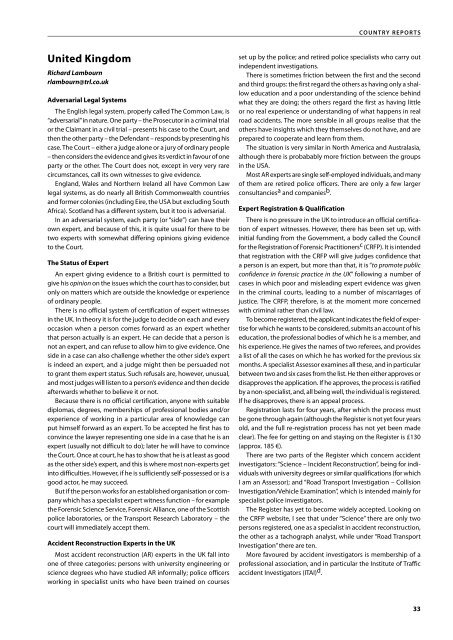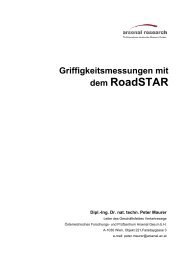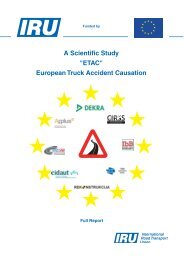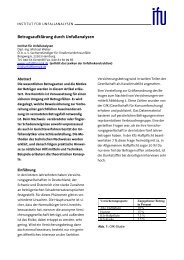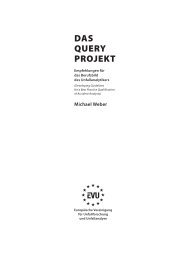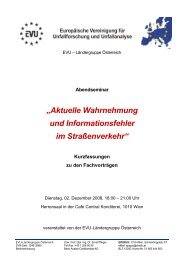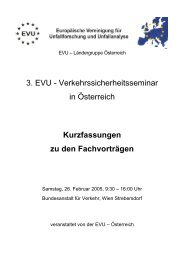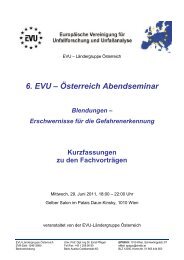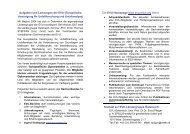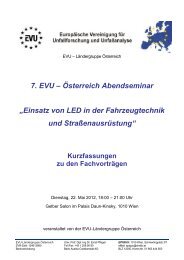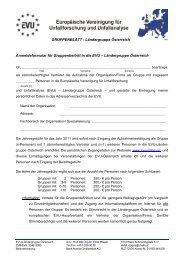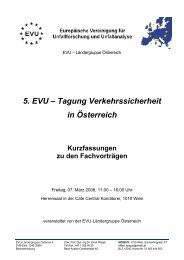THE QUERY PROJECT - European Commission - Europa
THE QUERY PROJECT - European Commission - Europa
THE QUERY PROJECT - European Commission - Europa
Create successful ePaper yourself
Turn your PDF publications into a flip-book with our unique Google optimized e-Paper software.
United kingdom<br />
Richard Lambourn<br />
rlambourn@trl.co.uk<br />
Adversarial legal Systems<br />
The English legal system, properly called The Common Law, is<br />
“adversarial” in nature. One party – the Prosecutor in a criminal trial<br />
or the Claimant in a civil trial – presents his case to the Court, and<br />
then the other party – the Defendant – responds by presenting his<br />
case. The Court – either a judge alone or a jury of ordinary people<br />
– then considers the evidence and gives its verdict in favour of one<br />
party or the other. The Court does not, except in very very rare<br />
circumstances, call its own witnesses to give evidence.<br />
England, Wales and Northern Ireland all have Common Law<br />
legal systems, as do nearly all British Commonwealth countries<br />
and former colonies (including Eire, the USA but excluding South<br />
Africa). Scotland has a different system, but it too is adversarial.<br />
In an adversarial system, each party (or “side”) can have their<br />
own expert, and because of this, it is quite usual for there to be<br />
two experts with somewhat differing opinions giving evidence<br />
to the Court.<br />
The Status of Expert<br />
An expert giving evidence to a British court is permitted to<br />
give his opinion on the issues which the court has to consider, but<br />
only on matters which are outside the knowledge or experience<br />
of ordinary people.<br />
There is no official system of certification of expert witnesses<br />
in the UK. In theory it is for the judge to decide on each and every<br />
occasion when a person comes forward as an expert whether<br />
that person actually is an expert. He can decide that a person is<br />
not an expert, and can refuse to allow him to give evidence. One<br />
side in a case can also challenge whether the other side’s expert<br />
is indeed an expert, and a judge might then be persuaded not<br />
to grant them expert status. Such refusals are, however, unusual,<br />
and most judges will listen to a person’s evidence and then decide<br />
afterwards whether to believe it or not.<br />
Because there is no official certification, anyone with suitable<br />
diplomas, degrees, memberships of professional bodies and/or<br />
experience of working in a particular area of knowledge can<br />
put himself forward as an expert. To be accepted he first has to<br />
convince the lawyer representing one side in a case that he is an<br />
expert (usually not difficult to do); later he will have to convince<br />
the Court. Once at court, he has to show that he is at least as good<br />
as the other side’s expert, and this is where most non-experts get<br />
into difficulties. However, if he is sufficiently self-possessed or is a<br />
good actor, he may succeed.<br />
But if the person works for an established organisation or company<br />
which has a specialist expert witness function – for example<br />
the Forensic Science Service, Forensic Alliance, one of the Scottish<br />
police laboratories, or the Transport Research Laboratory – the<br />
court will immediately accept them.<br />
Accident Reconstruction Experts in the Uk<br />
Most accident reconstruction (AR) experts in the UK fall into<br />
one of three categories: persons with university engineering or<br />
science degrees who have studied AR informally; police officers<br />
working in specialist units who have been trained on courses<br />
Co u n t R y R E P o R t S<br />
set up by the police; and retired police specialists who carry out<br />
independent investigations.<br />
There is sometimes friction between the first and the second<br />
and third groups: the first regard the others as having only a shallow<br />
education and a poor understanding of the science behind<br />
what they are doing; the others regard the first as having little<br />
or no real experience or understanding of what happens in real<br />
road accidents. The more sensible in all groups realise that the<br />
others have insights which they themselves do not have, and are<br />
prepared to cooperate and learn from them.<br />
The situation is very similar in North America and Australasia,<br />
although there is probabably more friction between the groups<br />
in the USA.<br />
Most AR experts are single self-employed individuals, and many<br />
of them are retired police officers. There are only a few larger<br />
consultancies a and companies b .<br />
Expert Registration & Qualification<br />
There is no pressure in the UK to introduce an official certification<br />
of expert witnesses. However, there has been set up, with<br />
initial funding from the Government, a body called the Council<br />
for the Registration of Forensic Practitionersc (CRFP). It is intended<br />
that registration with the CRFP will give judges confidence that<br />
a person is an expert, but more than that, it is “to promote public<br />
confidence in forensic practice in the UK” following a number of<br />
cases in which poor and misleading expert evidence was given<br />
in the criminal courts, leading to a number of miscarriages of<br />
justice. The CRFP, therefore, is at the moment more concerned<br />
with criminal rather than civil law.<br />
To become registered, the applicant indicates the field of expertise<br />
for which he wants to be considered, submits an account of his<br />
education, the professional bodies of which he is a member, and<br />
his experience. He gives the names of two referees, and provides<br />
a list of all the cases on which he has worked for the previous six<br />
months. A specialist Assessor examines all these, and in particular<br />
between two and six cases from the list. He then either approves or<br />
disapproves the application. If he approves, the process is ratified<br />
by a non-specialist, and, all being well, the individual is registered.<br />
If he disapproves, there is an appeal process.<br />
Registration lasts for four years, after which the process must<br />
be gone through again (although the Register is not yet four years<br />
old, and the full re-registration process has not yet been made<br />
clear). The fee for getting on and staying on the Register is £130<br />
(approx. 185 €).<br />
There are two parts of the Register which concern accident<br />
investigators: “Science – Incident Reconstruction”, being for individuals<br />
with university degrees or similar qualifications (for which<br />
I am an Assessor); and “Road Transport Investigation – Collision<br />
Investigation/Vehicle Examination”, which is intended mainly for<br />
specialist police investigators.<br />
The Register has yet to become widely accepted. Looking on<br />
the CRFP website, I see that under “Science” there are only two<br />
persons registered, one as a specialist in accident reconstruction,<br />
the other as a tachograph analyst, while under “Road Transport<br />
Investigation” there are ten.<br />
More favoured by accident investigators is membership of a<br />
professional association, and in particular the Institute of Traffic<br />
accident Investigators (ITAI) d .


